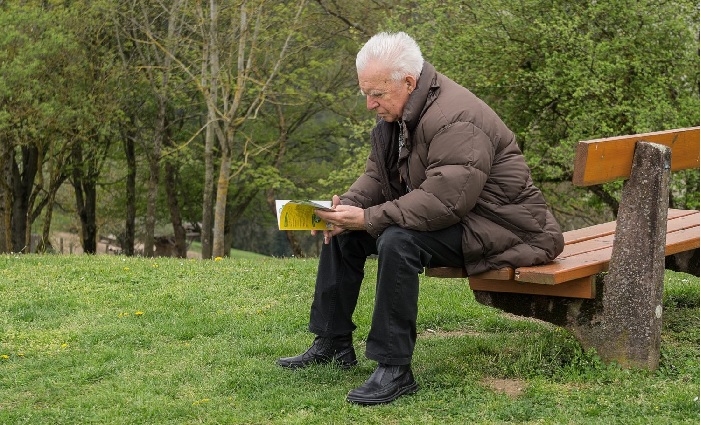Is the perspective on retirement amongst healthcare professionals different than in other industries?
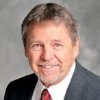
As a Retirement and Career-transition coach, I work to stay abreast of the issues and challenges that are evolving in these two areas. Combined with my 18 years of experience as an executive recruiter in healthcare, I’ve been able to gain insight into some of the retirement and career transition issues that are unique to healthcare executives.
Is there life after a healthcare career?
A Beckers Hospital Review article reports that the average healthcare CEO is 57 and plans to retire at 65 and that 61% do not plan to work beyond 65.
Online nursing forums indicate that most nurses expect to retire in their fifties and nurse executives in their early sixties, understandable considering the combined effect of the physical and psychological demands of the profession.
Does this indicate that healthcare executives are no more aware of the evolving retirement scene than executives in other industries? Is there still a prevailing 20th century mindset when it comes to retirement, one based on the three-stage linear life plan with its artificial finish line of 65 and “withdrawal into isolation?” A model that, for more than a half-century, has advocated an off-the-cliff move from labor-to-leisure, vocation-to-vacation.
Graphically, that 20th century model and its life-span altering consequences look like this:
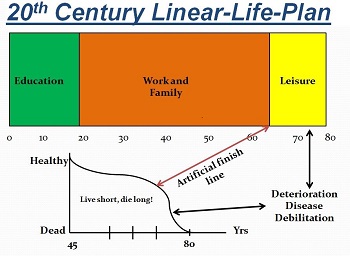
We’re at a place we’ve never been before. A place that renders this model irrelevant and potentially dangerous - physically, mentally, socially and spiritually.
The new reality is that we are living longer and healthier. We’re experiencing a “longevity bonus”, potentially as much as 30 years beyond the traditional retirement age.
When the arbitrary, politically-inspired retirement age of 65 was established decades ago, the average life span was around 55 and the old model made some sense. Guideposts weren’t important – few people lived to 65. But today, with lifespans for many stretching into 80’s, 90’s and beyond, the game has changed. We’re in unfamiliar territory with outdated institutions and policies and limited guardrails to keep us realistic about the new face of retirement.
But we instinctively know that thirty years of golf, travel, canasta and/or mah-jong just doesn’t make sense, nor can it be healthy.
A new retirement perspective is emerging, one that eschews tacking that longevity bonus onto the end and simply extending a period of “old age.”
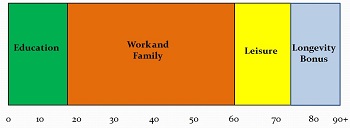
Instead it proposes an alternative model where that bonus is recognized as a period of productivity and purpose that can be interspersed with pleasure. A model that might look like this in the second half/third stage.
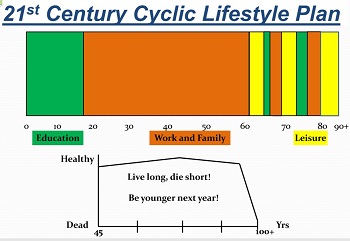
Under this model, there is no wasting of accumulated experience, skills and passions. Learning continues as does meaningful, purposeful work along with a broadening and deepening of social relationships. Combined, this increases chances to not only live longer but to die shorter by maintaining vitality, vigor and verve up to the end. And society gains as acquired skills, experience, wisdom and passions are redeployed and not squandered.
The dark side of retirement
As a society in general - and likely amongst healthcare professionals - we don’t appear to be making this transition to a new retirement mentality very effectively.
We are experiencing an unprecedented “dark side” component to retirement. It stems from (1) failure to acknowledge and plan for this extended life space and (2) a retirement planning process that is almost entirely dedicated to financial or “hard side” elements and with little or no attention to non-financial, “soft side” components.
We know that 2 of 3 retirees have gone into their retirement with no semblance of a non-financial plan.
Here are just a few sobering facts that speak to the affects of an unplanned retirement:
- By 2020, the number of retirees with alcohol and other drug problems will leap 150%.
- The NIH reports that, of the 35 million Americans age 65 or older, nearly 2 million suffer from full-blown depression. Another 5 million suffer from less severe forms of the illness.
- Depression is the single most significant risk factor for suicide among the elderly. The CDC recently showed a dramatic spike in suicides among middle-aged people.
- The overall, national rate of divorce in the United States is trending down. Except for one group: the 50-plusers, who have seen their rate of divorce surge 50% in the past 20 years. In fact, one in four couples divorce after age 50.
Is it the same for retiring healthcare professionals?
I don’t see healthcare pros being as susceptible to these issues or devolving into “roleless roles” and sinking deep into a lounger upon retirement because of the intensity of career roles already performed and the energy and commitment necessary to fulfill those roles.
However, this is also a group whose “nose to the grindstone and shoulder to the wheel” dedication doing such meaningful, purposeful work may shield them from the aforementioned issues. Retirement planning beyond the financial may be no more present than with the general population because of this.
As a retirement coach, I encourage pre-retirees and early retirees to put as much emphasis on non-financial planning as on the financial planning. Don’t expect that assistance from your financial planner. They are trained to advise on, and sell, financial products and most do an excellent job in helping their clients in that regard. However, they are not trained or equipped to dispense advice on life-planning issues.
Beware the retirement honeymoon
Research has shown that retirees experience a “retirement honeymoon” period of 1-3 years after which the realities of existence within a traditional retirement model sinks in. These post-honeymoon years of retirement can be disappointing, contentious and wasted if pre- or early-retirement planning doesn’t take place.
Here are some of the issues that often surface:
- Overcoming a loss of identity.
- Divergent post-retirement interests (career or personal) between spouses.
- Boredom and stagnation – even narcissism - due to a lack of challenge and social engagement.
- Depression and physical deterioration because of reduced activity and social interaction and lack of a sense of purpose.
Retiring healthcare professionals can rock the world – on their terms
Personally, I feel that healthcare professionals can rock the world in the new version of retirement. Drawn to the healthcare profession out of a desire to help, having flourished in a life-and-death environment and seen and experienced real-life issues on a deeper level than people in other professions, there is a wonderful, unique and powerful foundation on which to build to the continued benefit of our society.
Consider the freedom to impact and serve in a very unique, personal way without the restrictions of politics, bureaucracy, government controls. Equipped with a longevity bonus and a background unparalleled in touching lives, the possibilities are restricted only by one’s thinking and creativity.
I fear that the persistent pull of the 20th century retirement model will suppress that creative thinking and waste a pool of incredible talent and problem solving.
There is life after healthcare – don’t panic
Those are the words of a new friend of mine, one of a number of retired friends who are integrating their essential selves, passions and their natural and acquired skills and leveraging them back into the marketplace where they will continue to do good.
A recently retired hospital CEO in Missouri, this new friend has chosen to pursue things that interest him. He has chosen to broaden and deepen his passion for civic and community involvement through volunteer board-level positions, paying forward his executive administrative experience as well as satisfying a passion to serve. He balances that with deepened family involvement, by immersing himself in learning a second language and by building black-powder, muzzle-loader rifles as a stress relieving hobby. My sense is that he has never operated at a higher energy and enthusiasm level.
For a retired CNO/CNE friend, it’s taking her doctorate in nursing and decades of top-level nurse management experience back into the marketplace to help nurse leaders cope with the pressures of today’s broken healthcare system and be more caring patient advocates. She’s doing it through a childhood passion for writing and teaching, using the internet, social media and book publishing. As she approaches 70, she has a passion-fueled energy that’s hard to keep up with.
Three suggestions to help the move to a successful new retirement
- Retire to something, not from something.
- Use the 3-5 years ahead of your retirement date to chart a retirement course with your spouse/partner outside of the financial planning process. Get on the same page early. Work with a life or retirement coach to help chart this course.
- Consider “practicing” retirement now by experimenting with things that may interest you beyond tennis/golf/fishing/yoga. Start isolating the things that excite and motivate you and that will help you achieve a fulfilling, happy retirement.
Suggested reading:
- “The New Retirementality”, Mitch Anthony
- “Boundless Potential”, Mark S. Walton
- “The Big Shift”, Marc Freedman
- “Finding Your Own North Star”, Martha Beck
Smooth sailing!!

 Gary Allen Foster is an executive recruiter, retirement and career transition coach, writer, and speaker. He is an over-70 portfolio-career guy and audacious ager dedicated to helping folks in the over-50 crowd adopt a new perspective on how to live longer, live better and with more purpose in the second half. He coaches, speaks and writes publicly on the issues of mid-life career transitions, planning for purposeful retirement and achieving better health and greater longevity.
Gary Allen Foster is an executive recruiter, retirement and career transition coach, writer, and speaker. He is an over-70 portfolio-career guy and audacious ager dedicated to helping folks in the over-50 crowd adopt a new perspective on how to live longer, live better and with more purpose in the second half. He coaches, speaks and writes publicly on the issues of mid-life career transitions, planning for purposeful retirement and achieving better health and greater longevity.

